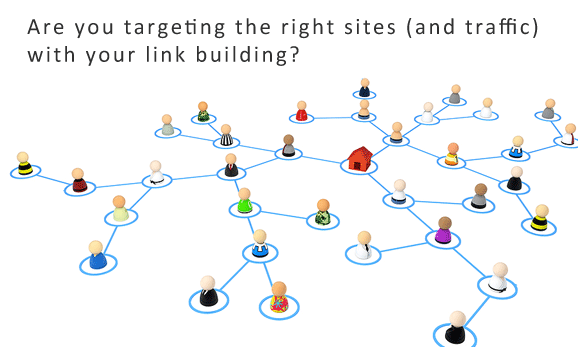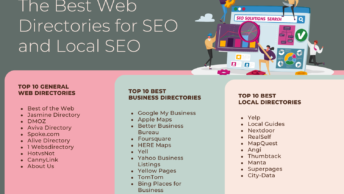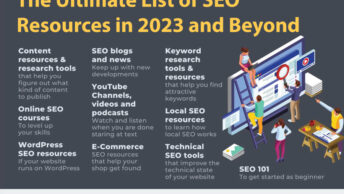
If you’re interested in link building for your website, you’re probably familiar with Web directories. You’ve probably even seen huge Web directory lists encouraging you to submit your site to as many directories as possible. These types of lists are still (unfortunately) often sorted by Pagerank. Yet Pagerank is one of the last things you should look at when choosing Web directories to help you promote your site. Let’s talk about why.
Risk vs Reward (and Getting Your Priorities Straight)
Mass directory submissions are a form of spam. But more importantly, when you target those directories based on Pagerank, you risk being accused of trying to manipulate your own Pagerank by Google, which can lead to having your PR or rankings manually penalized.
If you really want to get the most from directories, it’s not about submitting to every directory with link juice to spare. It’s about quality over quantity — submitting your site to Web directories that can actually reach your target audience and send them your way as relevant traffic as opposed to simple back links. After all, it’s that relevant traffic that’s most likely to convert to sales, sign-ups, etc. And those are the end goals you should keep in mind. Improving your own site metrics goes far beyond generic visitor numbers.
Why PageRank is a Faulty (Pretty Much Worthless) Metric
There are a few different reasons you should stop looking at a directory’s Pagerank when deciding to submit to them or not. Here they are:
- Pagerank doesn’t reflect traffic.
- Pagerank is easily manipulated.
- Pagerank has nothing to do with audience targeting.
- Pagerank can change (or disappear) at any time or at Google’s whim.

Instead focus on things you can control, monitor, and improve without fully relying on a third party like Google. For example, you could view a Web directory’s overall incoming links to see if they’re getting traffic from sites that are relevant to your own (or from spammy sites). You could look at things like blogs or other resources tied to the directory and see what kinds of visitors they go out of their way to appeal to (or in the case of blogs, what type of visitor is actively engaged with the directory’s site). If you really wanted to do your research, you could even contact owners of similar sites to yours who are already listed in a directory, asking them if they find it to be a worthwhile investment or if it seems to send targeted traffic. If you’re direct competition they might not be willing to share that information. But if a colleague is listed and you know each other already, they might be more inclined to share. It doesn’t hurt to ask.
What are your thoughts on looking at Pagerank when choosing Web directories? Do you still obsess over it? Do you ignore it? Do you fall somewhere in between? Why? Leave a comment below to tell us what you think.






You make some good points. However, and I feel for the position you’re in, directories seem the most irrelevant to me on exactly the issue of traffic. Admittedly, my data sets are quite small, but I see very little traffic to client sites (excepting attorneys) coming from various directory listings (high quality, low quality, niche, generic, etc…).
Are there particular directories you think are doing a really good job? Success stories?
There may be opportunity for some directories to offer specific value-adds to attract more users, and thus the potential of referral traffic from listings.
My cynicism aside, I will take your advice under consideration and give some extra thought to what I’m doing with directories.
I’m not sure what you mean about the “position I’m in.”
But….
1. I used to work in the indie music industry, and that’s another example where niche listings could lead to a lot of traffic. You noted similar success with attorneys. If you go for niche options, look for legitimate ones — ones with niche authority and ones where the sites offer more than just a directory. They tend to deliver the best.
2. If you go with general directories I’d stick to premium ones or free ones with a truly unique spin. A few years back I started the first article-specific free directory to support other writers and bloggers and to give readers a way to find content without the commercial search results mixed in. It went over well at the time on both sides, but sadly I didn’t have the time to maintain it any longer. Look for things with an edge like that — directory owners who go out of their way to offer more either for those submitting sites or for visitors that they can drive to those directory submissions (kind of like we do here with a collection of webmaster tools and several blogs to attract niche audiences that would interested in the sites listed in our directory).
J, appreciate your response. I wholeheartedly agree with your recommendations re: niche listings.
By “position you’re in” I was referring to your interest in the success of directories. I wouldn’t want to be trying to make that work, myself, but I certainly don’t fault you. Best of luck in your endeavor.
We fall somewhere in between on this. I feel like the more I read and learn about link-building, the more confusing it all becomes! It often feels like there’s a different answer every day!
There’s an easy answer to that. Stop listening to the changing advice. Find people who are not only successful (and who have been over the long-term), but those who don’t constantly change their approach to link-building. When they do that, they’re chasing fads rather than employing solid fundamentals. If they have to change link-building tactics every time algorithms change, they don’t know what they’re doing. Focus on giving people things they naturally want to link to and share. It’s the only long-term proven strategy around and one that search engines aren’t interested in penalizing.
I agree with you, PR should not be considered while submitting to directories. But I encourage submitting to lots of directories; in fact I feel if you are really serious, you should just submit to paid directories – just 4/5 good ones. Most of the submissions to free directories do not get approved and it turns out to be just a waste of time and effort.
I’m a little confused by your comment. First you say you recommend submitting to a lot of directories, and then just 4 or 5. Would that advice vary depending on the type of site? What would you say is an upper limit before the value is no longer worth the time? After all, in any kind of marketing (which link-building is), ROI is extremely important.
And what tips would you give a site owner to help them determine which directories are “good ones?” I think that’s part of the problem. People resort to PR because they think PageRank is in direct correlation with the directory’s quality. But we know that isn’t true. What other factors do you think are important?
PageRank is just a random number. And I will tell you why I think so.
I have a new website, setup in Nov. 2011. I also setup a separate domain for a blog. Both sites got PageRank for the first time on Feb. 6, 2012. According to Google Webmaster, the blog has 22 backlinks. The home page of the blog got PR3. Most internal pages also got PR3, a few got PR2. Now the main website.. good clean design, good SEO. Most internal pages got PR3 or PR4. The domain has 65 backlinks, quality backlinks from reputed sites. None of the internal pages is linked from any other sites, only the domain. Well, the domain got PR1. All pages has same header and footer and the home page has good content. I don’t understand why the domain would get PR1 while internal pages (some of them were created just a few days ago and have no inbound links from any other site) would get PR3 or PR4. One page simple has one line “We are experiencing issues with IE Browser”, this page was created Jan 20, 2012, got PR3.
Bottomline, Google is too much hype and no substance. Don’t sweat about PR, SEO or backlinks. Just focus on getting traffic using right marketing.
I can agree and disagree with some of your points.
I don’t think “random” is necessarily the right word. While you did seem to get erratic results early on, we can’t be sure why it happened. For example, many blogs have duplicate pages without realizing it (like different URLs to access a category page which in turn links to posts). That said, I haven’t seen similar results before in the dozens of blogs I’ve run. So something wonky might have been going on around your launch time. It’s also important to remember that the pagerank we see is not live pagerank — that’s constantly updated on Google’s side, so it may have gone back down since the pagerank checkers pulled the rank you’re seeing.
That said, I agree that no one should be agonizing over pagerank or seo in general (to the point where they’re blatantly trying to game the system as opposed to working toward earned organic rankings). I’m not sure I agree about backlinks though. If you only worry about backlinks for pagerank or SERP rankings, then I agree. But backlinks aren’t bad in and of themselves. They’re often how new visitors find out about your blog. So I wouldn’t discourage anyone from pursuing reasonable and well-targeted links (such as links tied to high quality comments on related blogs).
Let me rephrase. People should not spend too much efforts in getting backlinks assuming that more backlinks mean better PR. Based own my own analysis of my websites, I can say that once you have about 20 good quality backlinks, you get full points for the backlink part of the algorithm (just my assumption based on what I have seen ). The focus should be to get backlinks to generate more traffic rather than just spamming the Web to get more links from pages nobody visits (or at least if you target audience is not going to visit). Focus more on page contents and clean page design. Don’t go too much graphics heavy.
What I have also noticed that search engines give a high priority to keywords in page titles. So focus on finding good keywords and then create multiple pages for each set of related keywords. Each of these pages can be altered slightly in contents so that they are not duplicate. Don’t through in random keywords in the titles. The keywords that you put in in the titles should be related in the way that they appear together at other sites too.
Personally I consider multiple pages covering the same things (with slightly different keywords) to be shallow content. That’s a part of what got the lousy content mills with the Panda update (finally).
But this…
“The focus should be to get backlinks to generate more traffic rather than just spamming the Web to get more links from pages nobody visits (or at least if you target audience is not going to visit). Focus more on page contents and clean page design. ”
This I can agree with 100%, and I really wish more people felt that way. 🙂
Hello madam,
My website page rank is 2. Before i read your article i was choosing only high page rank directories only. After that i am very clear page rank does not help for get traffic. I am very cleared now madam. thank u so much.
one doubt, should be the list of directories updated one?
You should always try to make sure directories you choose from are updated. If it looks like a directory hasn’t had new entries in a long time, for example, I wouldn’t waste your time. It probably has plenty in the queue that aren’t being added. I’d worry more about choosing directories individually than using “lists” for mass submissions. See what other sites in your category look like. And pick ones that have quality listings similar to your own site.